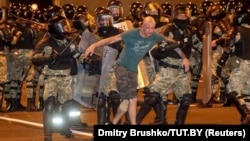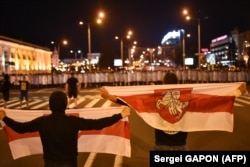Riot police and protesters came to blows in Minsk and other Belarusian towns late on August 9 as supporters of candidate Svyatlana Tsikhanouskaya rejected official data that showed incumbent President Alyaksandr Lukashenka winning Belarus’ presidential vote by a huge majority for the sixth time since 1994.
Early on August 10, Central Election Commission Chairwoman Lidiya Yermoshina began to announce incomplete preliminary results from four regions as well as one district of Minsk. The results, announced on the state-run Belarus 1 television channel, generally give President Lukashenka an overwhelming lead (ranging from 95.7 to 67 percent, depending on the district), with Tsikhanouskaya finishing a distant second, no higher than 15 percent.
National figures were not released.
An earlier state exit poll had reflected the preliminary-result calculations, giving Lukashenka around 80 percent of the vote and Tsikhanouskaya less than 7 percent. No independent professional exit polls are allowed in Belarus.
Speaking at a press conference after the polls closed, Tsikhanouskaya said that her campaign will defend her supporters’ votes by all ways allowed under the law, if President Lukashenka declares victory.
Tsikhanouskaya urged supporters to avoid taking to the streets the night of August 9, saying that she not would give the authorities grounds for a “provocation.” Current Time reporter Roman Vasyukovich reported by telephone from the scene.
Military vehicles, armed troops, and police checkpoints were earlier photographed within the city – an apparent attempt to forestall any demonstrations over the election results. Downtown streets were closed by mid-evening on August 9, as well as downtown metro stations.
As reports of clashes multiplied, however, Tsikhanouskaya issued a statement appealing to both police and her supporters to “use only proportionate and the most necessary measures” in response to “provocations.”
“Now, any violent confrontation is pointless. The country has changed,” she said.
The worst clashes appeared to occur in the Belarusian capital near a World War II memorial area north of the city center known as Hero City.
A video shot by the independent Belarusian news service TUT.by showed a crowd of mostly young, male protesters on the Avenue of Victors shouting at a line of riot police to leave. The police, known as OMON, gave chase, beating some of the protesters with batons as screams rang out.
Thanks to a widespread Internet outage, videos of the violence in Minsk and other locations came largely from footage posted on the messenger app Telegram by vloggers and the independent news service TUT.by.
Another video from Hero City, posted by the vlogger NEXTA, showed an apparent police vehicle ramming into protesters, one of whom climbed onto its front bumper before falling off. The vehicle appeared to proceed over him.
Police also used stun grenades and tear gas in response to demonstrators, TUT.by and RFE/RL's Belarusian Service reported. Ambulances and a fire engine were reported headed to the scene.
Just to the south of Hero City, closer to the very center of Minsk, riot police also fought with and detained protesters at a shopping center called Na Nemiga, according to footage posted on Telegram by NEXTA.
Information about the number of injuries and detentions was not immediately available.
To the southwest of Minsk, in the town of Baranovichi, thousands of people clashed with riot police after the exit poll results were announced, according to one eyewitness.
As Soviet rocker Viktor Tsoi’s Peremen, or Change, played out of cars, protesters yelled at the riot police, known as OMON, to put down their shields, 50-year-old resident Oleg Romanenko told Current Time. Police use of a water cannon forced the crowd back, but protesters demand that officials tell them “the truth” about “falsifications in the elections,”
“There’s never been anything like this in Baranovichi …” said Romanenko, who described himself as not a Lukashenka supporter. “I think that people will keep standing until [they secure] victory.”
“Victory,” he added, would be marching to the city government headquarters and demanding that the head of the city government, Yury Hromakovski, explain suspected voting irregularities to these demonstrators.
A few hundred kilometers to Baranovichi’s east, a few hundred people also were reported to have gathered in the center of Mohylev, , the seat of the region where Lukashenka first got his start in politics. TUT.by reported riot police detained roughly 20 people, including its journalist Angelika Vasilevskaya.
Another of the news service’s journalists, Olga Komyagina, was detained in Hrodno, a city close to the Polish border. Journalists accounted for three of 10 detainees there, according to TUT.by.
For independent election observer Nastya Matchenko, a Minsk native, the clashes demonstrate that “people are tired of living in such a country where you can’t do anything, where you can’t observe the elections, you can’t express your disagreement with the current authorities.”
For President Lukashenka, however, such demonstrations only signify a conspiracy to disrupt his rule and law and order. He asserted earlier on August 9 that “Nothing will get out of control.”





